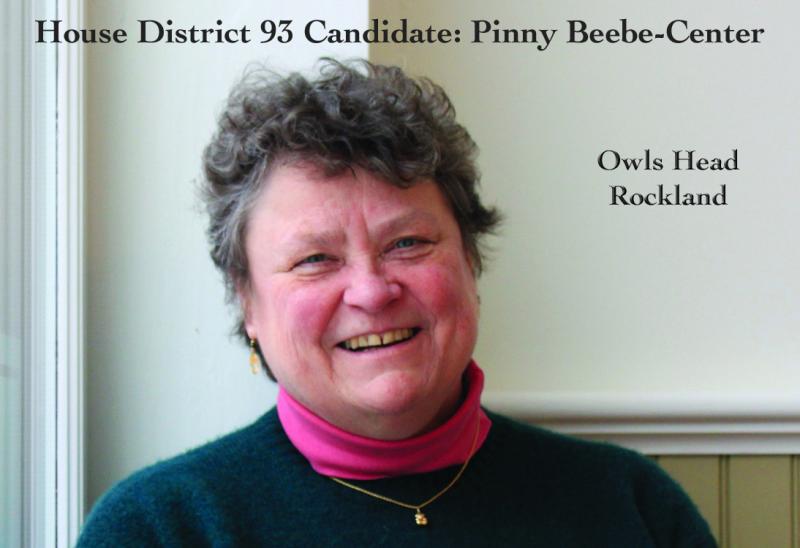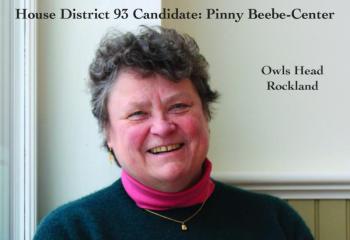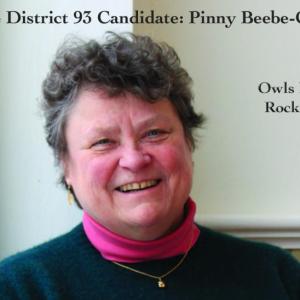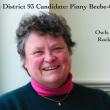House District 93 Candidate: Pinny Beebe-Center
Pinny Beebe-Center, D-Rockland, is seeking reelection to the House seat that represents Owls Head and Rockland in the Maine Legislature.
I live in Rockland and bought my house here in 1980. I commuted to Augusta working for the Dept. of Education and the Dept. of Transportation for over 20 years. My Dad was in the Coast Guard, I am the oldest of six kids and we moved every couple of years up and down the East coast.
I moved to Maine after college in 1975. I first ran for public office in 2002, and was elected Knox County Commissioner. I was re-elected in 2006. I have had several positions since 2002 that worked to better the lives of the people in our community. I was the business manager at the Community School (now Wayfinder Schools); Regional Manager for Penquis Community Action Program; and have been a consultant to a number of local organizations and efforts to increase access to mental health services for uninsured people, develop aging-in-place programs, attract and support addiction prevention and recovery programs, integrate access and provide housing for people who are homeless.
What are the most pressing issues facing Maine today, and how would you like to see them resolved?
The thing that concerns me the most is the well-being of the people in Maine. Everyone deserves access to affordable housing, healthcare, education, food, and jobs that pay a living wage. Everyone also deserves respect. Common courtesy and respect are at the core of what I believe, and yet we have gone from a state where people care for and look after one another, to one of pointing fingers and demonizing those who are different than ourselves.
I believe we should release the voter-approved bonds that will build more affordable housing for seniors.
I believe that we should expand access to healthcare. We have about 73,000 people in Maine who do not have access to healthcare because our governor has refused to accept federal money to expand Medicaid.
We should provide state funds to support education at the voter-mandated 55 percent of cost. For our state to flourish, we need to support education from early childhood, which is critical, through adult learners.
Hunger is a major issue in our state, where more than 60,000 children struggle with food insecurity and 84,000 children qualify for free or reduced school lunch. We need to make sure that families who need food receive the help they need without being stigmatized, and that people receiving food subsidies have access to fresh and healthy food.
Many of the jobs in our state do not provide a living wage. Anyone who works full-time deserves to make a livable wage. It’s a fairness issue. One-third of all Maine workers receive the minimum wage of $7.50 an hour. Here in Knox County, a “livable” full-time hourly wage to cover basic necessities for one adult and one child is $22.68.
How will you protect the local (municipal) taxpayer as you help shape a state budget?
In Maine, towns do not keep any of the revenue generated by state taxes. Here in Rockland, we are considered a “service center,” which means that people from all the towns in Knox County, as well as some from Lincoln and Waldo counties, come here for services such as TANF, food stamps and Social Security Because of the services offered in Rockland, our population increases every day from about 8,000 to about 15,000. In summertime, that number rises to 20,000 people a day. The infrastructure needed to sustain all these people is paid for by about 3,500 Rockland households. With all these people purchasing goods and services in Rockland, the city should be able to keep a portion of sales tax revenues. I will argue in Augusta for revenue sharing that allows cities like ours to keep a portion of state tax revenues to support the vital services we provide.
What policies would you create and promote to build Maine’s Natural resource-based economy?
Working waterfronts are essential. As pressures build to develop waterfront properties in Rockland and Owls Head, measures need to be taken to ensure waterfront access to our fishing families and the businesses that support them. This includes strengthening our ability to conserve working waterfronts through programs like Land for Maine’s Future.
Penobscot Bay Pilot has posed questions to each candidate running for the Maine Senate and Legislature, providing the opportunity for the public to better understand their position on issues important to the state. The candidates have responded with their individual written answers.
One of our greatest assets in Midcoast Maine is the access to outdoor recreation opportunities for residents and visitors alike. Before we make any major changes in the way we use our natural-resource assets, we need to have discussions that include all members of the community and develop a shared vision of how they should be used and protected.
What policies would you create and promote to sustain the natural resources of this state (fisheries, timber, mining)?
Thanks to leaders within the fishing industry, we’ve made great strides toward a sustainable fishing economy here in Maine, but the future of that industry is far from certain as the Gulf of Maine becomes warmer and ocean acidification affects our marine ecosystem. Climate change is a factor that needs to be considered in every legislative decision affecting our natural resources, since it will have a profound effect on the future of our resource-based industries that we may not be able to control. All of us in the Legislature will need to consider these factors when we develop policies. This is not about party allegiance; it’s about the well-being of the people and the economy—and future—of Maine.
What is your position on alternative energy and public investment into it?
Alternative energy is the future of our region, our state and our planet, and it should be a priority for investment. Investing in renewable energy will help create new livable-wage jobs, training, and economic stability for many families and areas of the State.
What is your position on the five citizen initiatives that are before voters Nov. 8?
There has been a huge amount of misinformation—pro and con—presented to influence voters on these issues. I can’t emphasize strongly enough the need for every voter to get unbiased information on each of these initiatives. The voter guide available from the League of Women Voters of Maine presents a nonpartisan discussion of the pros and cons of each initiative and what each would mean to our citizens. Get a copy online at www.lwvme.org/elections.html.
My own positions on these issues are:
· #1: No. I believe it is premature. I don’t believe we have done the ground work in terms of education and safety to legalize marijuana. I think we should do our safety planning and educating and in two years it should come again before the public to be legalized.
· #2: Yes. We should invest in our children and provide a sustainable future for our families by providing the money needed for education. It will take a burden off property taxes which will allow some respite for a majority of families.
· #3: Yes. I believe that background checks for people who want to have guns is only common sense. If there is some fine tuning from how the citizen initiative is written, then— without changing the need for background checks—other impacts can be dealt with in the implementation language.
· #4: Yes. People don’t choose to be poor or live in unstable circumstances. With a livable wage, families will be able to contribute and participate in their community and not live on the fringes and many of them will not have to supplement their basic survival with State services. It is good for business and good for Maine.
· #5: Yes. I believe that ranked choice voting will offer a greater voice for people and provides a way to eliminate the rancor and deception between candidates
What issues are emerging from your conversations with the public as you go about your campaign, and what solutions do you envision?
For the past couple of weeks, I’ve been attending small community gatherings organized by Rockland and Owls Head neighbors. These have been attended by people of all political persuasions, and have been a chance for me to hear what’s on the minds of my constituents and talk about how we can work together to address the challenges we face. I’ll be attending more of these meetings between now and Election Day on November 8. The issues I’m hearing about include:
- The need for livable wages. People are concerned about the amount of the hourly wage and about the quality of available jobs.
- The inability of people to hold civil, respectful discussions and offer solutions to the many challenges of living in Maine.
- The feeling of helplessness as events and situations move in a direction in which citizens feel they have no voice.
- The diminishing quality of education through the years. There is still a stigma for vocational education; the cost is growing without improved outcomes, there is an inherent inequality between college-bound and non-college bound students; teachers spend more time and effort being social workers than teaching.
We need to have meaningful discussions involving all people and create solutions that all will need to support and participate in. It is not just up to the people at the top- it needs to be pushed back to the people on the ground and communities need to organize themselves to meet their needs and work with legislators and local government people to put meaningful solutions in place and collectively determine how best to pay for them.
A recent Maine Dept. of Labor report indicates the work force will get even older, and more jobs will require post-secondary education. How will you work to build a knowledge-based economy when so many of Maine high school graduates do not seek higher education?
The University of Maine has done a great job of making college-level courses and degree programs accessible to a wider range of Mainers, beginning when they are in high school and including working adults. I’d like to see that approach expanded. I would also like to see the stigma removed from vocational education, and to see certification and advanced study programs expanded. Post-secondary education does not necessarily mean a college degree; additional learning after high school is needed, and can be accomplished in many ways.
Is Maine doing enough to accommodate the successful assimilation of immigrants?
I would like to see the discussion on immigrants shift away from the fear-based rhetoric of our governor and his supporters to an open discussion of why America is America and why Mainers are proud to be Americans. Until we can have civil community discussions about this and other similar issues, we’ll remain polarized and will not move forward. The first step is to invite and include immigrants in these discussions. I’d like to see more communities offer discussions with immigrant groups and faith leaders to dispel misinformation and fear.
What is the best legislative activity that has occurred in Augusta over the last six years? This does not have to mean legislative action, but can include collaboration, research, etc.
The negotiation on the solar bill was absolutely phenomenal. It opened up the door to retain net metering. It included present power suppliers. It engaged several sectors of our state—business, the energy sector, community leaders and legislators—in a productive and forward-looking planning process. It was just a remarkable negotiation. There was something in the final bill for everyone, but more importantly it opened the future for Maine people in terms of protecting the environment, creating jobs, and having a sustainable future. The fact that the bill was vetoed by the governor and that the House was just short of the votes needed to override that veto was a huge setback, but I have every confidence that due to the remarkable nature of the negotiation, the bill will be reintroduced and will pass.
How would you define “good state government”?
Good state government meets the basic needs of all the state’s residents in a manner that’s both affordable and sustainable. This goal should not be compromised by partisan politics. I strongly believe that it can be accomplished in a way that meets the needs of all citizens and political parties. All of us in the Legislature were sent to Augusta to represent the interests of the people in our state. That’s just what we need to do. Not some people’s interests. All people’s interests.
Is there any other topic or issue you’d like to talk about here? Have at it!
Even if you don’t agree with all my positions on the issues, I am committed to representing all the citizens in District 93, and to work for solutions that reflect what we have in common, rather than what divides us. Please vote on November 8. Feel free to share your concerns, and if you have questions or want to discuss any of these issues before the election, please don’t hesitate to give me a call at (207) 596-3937or send me an email at pinny.beebe-center@legislature.maine.gov
Event Date
Address
United States




























